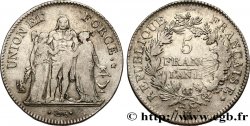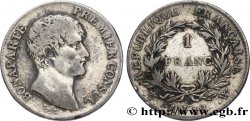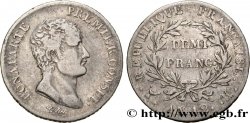v10_0072 - 5 francs Bonaparte Premier Consul 1803 Paris F.301/1
MONNAIES 10 (2000)
Начальная цена : 609.80 €
Назначить цену : 1 448.27 €
Цена реализации : 1 547.36 €
Начальная цена : 609.80 €
Назначить цену : 1 448.27 €
Цена реализации : 1 547.36 €
Тип 5 francs Bonaparte Premier Consul
Дата: An XI (1802-1803)
Монетный двор / Город: Paris
Количество отчеканенных монет: 3877151
Металл: silver
Проба: 900 ‰
Диаметр: 37 mm
Ориентация осей монеты: 6 h.
Вес: 24,97 g.
Век: inscrite en creux * DIEU PROTEGE LA FRANCE
Комментарии о состоянии
Frappe superbe, centrage excellent, coin neuf, sans velours sur les reliefs avec un brillant métallique sur toute la surface. L’éclat de surface de la monnaie donne des aspects très variés selon les angles d’éclairage et une impression de relief extraordinaire avec une éclairage venant de la gauche. La patine grise soutenue est égale sur les deux côtés avec des tonalités bleues et violettes très discrètes. Le coin de revers présente quelques petites aspérités et un petit point sur l’extérieur du 5 ; il ne peut s’agir d’un coin modifié puisque nous sommes dans la première année de frappe à un nouveau type, nous ne pouvons déterminer la cause de cette variante. La question peut se poser. Aucun défaut visible à l’œil nu sauf un infime petit choc sur la jugulaire et deux minuscules rayures au-dessus du F de FRANCS. À la loupe on distingue d’infimes traces de cheveux et égratignures dans la patine. La qualité du marquage de la tranche est extraordinaire de profondeur et de régularité ; on constate même que le rebord de la pièce forme sur la tranche une double rangée de pointillés qui correspondent aux rebords extérieurs des oves du listel. S’agirait-il d’un exemplaire de présentation ?
Ссылки в каталоге: :
Лицевая сторона
Аверс: легенда: BONAPARTE - PREMIER CONSUL..
Аверс: описание: Tête nue de Bonaparte à droite ; signé Tiolier cursif au-dessous.
Обратная сторона
Реверс: легенда: RÉPUBLIQUE FRANÇAISE. 5/ FRANCS. / AN XI. A.
Реверс: Описание: au centre dans une couronne formée de deux branches d'olivier.
Комментарий
Cet exemplaire est celui de la Collection Idéale. Il illustre le type dans le FRANC III en couleurs et est la pièce de couverture du FRANC II. C'est de très loin le plus bel exemplaire de la 5 francs Premier Consul que nous ayons répertorié, tous ateliers et années confondus.








 Cообщить об ошибке
Cообщить об ошибке Распечатать страницу
Распечатать страницу Отправить мой выбор
Отправить мой выбор Задать вопрос
Задать вопрос Consign / sell
Consign / sell
 Информация
Информация









